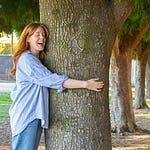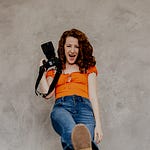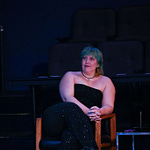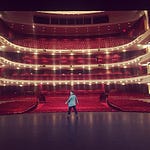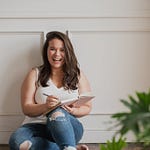Everyone please welcome my dear friend and fellow actor and model, Chloé Godard, to A Broadway Body: Continued Conversations! Chloé is an actor, hand model, fit model, yoga teacher, and voiceover artist, along with a close friend of mine. From working with her hands on set for companies like Mattel, to fit modeling for shoe companies like Lulu’s, to acting in national commercials and film, Chloé is no stranger to her body parts being in the spotlight.
In our conversation, we touch on so many important topics. Chloé shares how she strives to use inclusive language while leading her yoga classes, the importance of listening to cues from your body so you can properly nourish and move your body, and how we have to reframe what our personal best looks like because our bodies are constantly shifting and evolving from day to day. There’s so much wisdom Chloé shared in our conversation, and I cannot wait for you to listen!
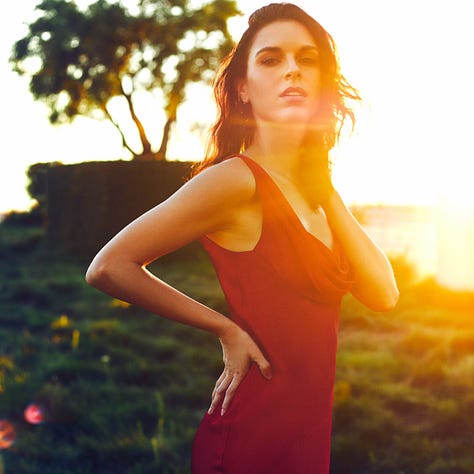
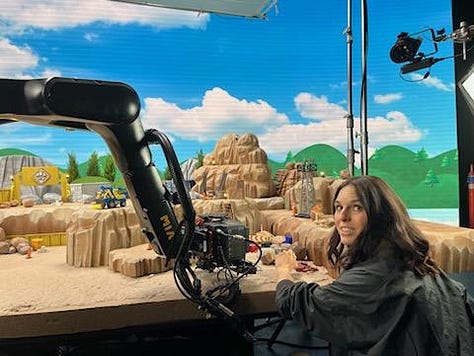
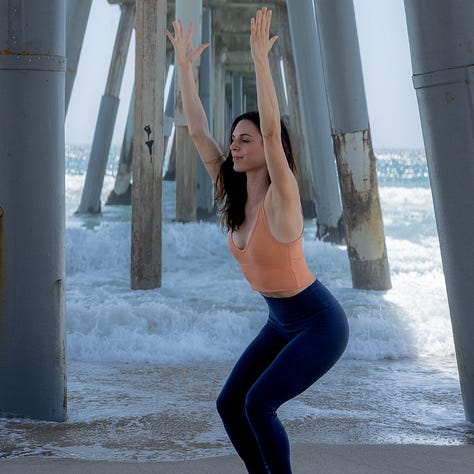
“ I have been thinking about, too, inclusivity for all bodies, and I know there's gonna be so many things that I'll miss, but I've even been thinking about how not everyone has ten fingers and ten toes. So instead of cueing people, and for this example saying, “Stretch your ten fingers out on the mat,” I don't know, I just say, “Stretch your fingers out on the mat.” Some people have trauma with their body, and using trauma-inclusive language, I find that fascinating and I wanna even learn more about that. You could just go on and on how different people's minds are and their bodies and the things that go on with that, but I think we do have to give you ourselves grace and other people grace at the end of the day.”
- Chloé Godard
Chloé Godard: My whole life story through my body. I guess we'll kinda start from the beginning.
Megan Gill: Okay. I love it.
Chloé Godard: I was a dancer. I didn't do sports, so I danced competitively for 10 years with my sister, which was so fun. I guess some people do say dance is a sport, you know? There are two different schools of thought for that, but I loved dance. It was such a fun way to be creative and express myself and use my body. That was probably when I was in middle school to high school, and then that's when I got into more theater and stuff like that.
Then when I went to college, I danced a little bit less, and I was a little bit more in the theatrical realm, and you probably get this too, doing theater in college is a lot of body movement still. I also did stage combat, so I did a lot of training with rapier dagger, knife onstage, physical contact. So looking back, I feel like I have been really in tune with my body and have used it in so many different shapes and forms, constantly using it even though I was not an athlete.
Then when I came to Los Angeles for acting, I stopped dancing and was using yoga as my form of fitness. I've been doing yoga since I was 15, so a long time. And I'm now a certified yoga teacher as of March of this year, 2025. So that's been such a fun journey doing it for so long but now doing it in a different aspect. Then being in Los Angeles trying to support myself acting for so long is when I fell into hand modeling, and I've done a lot of toy commercials, and that has been very fun because I never imagined being a hand model or knowing what a hand model was.
Megan Gill: Knowing that your hands could be such a hot commodity in your career.
Chloé Godard: Yeah! Front and center. So I wanted to play piano when I was younger, but my parents couldn't afford to get me lessons, so I played guitar a little bit, and then my dad would just always compliment my hands. He'd say, “Oh, you have such beautiful thin, long fingers.” So then with hand modeling, that was always just a funny thing. I'd be like, “Oh, well I guess people have noticed my nice hands. So I do feel like they're proportionate to my body. But yeah, it's been fun to see a part of me on screen and also knowing that it's my hand. I'll see certain commercials and I'll be like, “Oh, okay, that's my hand,” or I won't remember a commercial, and I'll look back and I'll say, “Oh yeah, that's my thumb.” Now I feel like I know my hands so well. How often do you look at your body parts and know what they look like, you know? Do you know what your elbow looks like? Can you pick your foot out of a lineup?
Megan Gill: Maybe, honestly. I don't know. I'm kind of weird like that. I like my feet, so I look at them.
Chloé Godard: I’m like, “I could put my hand outta a lineup.” And my wrist is my favorite body part. I love my wrists. They're nice and little, tiny. I like the little bones. I love seeing the little veins on the insides. I'm like, “Oh, I'm alive. That's so nice and beautiful.”
Megan Gill: Blood is pumping through me.
Chloé Godard: Blood is pumping through me.
Megan Gill: And how cool also that your hands, this thing that we almost like – I don't mean to speak for you, but I almost take for granted, or we never look at our hands and we're like, “What a good part of our body.” Well, when I was transcribing, I was maybe praising my hands like, “Wow, you're doing a lot of good work for me,” especially when I started to notice they would get sore and tired and all of that, but what a cool experience to connect so deeply and to have such a strong relationship with this part of your body that not many people probably have a strong relationship with.
Chloé Godard: Yeah! I'm so grateful for my hands, and through yoga I also learned how important your feet are to your body, and just like that is your foundation and how you stand upright and straight. Your foot health is so important. So the more knowledge that I gain and the more experiences that I have, I'm finding that I find a greater appreciation for my body and the things that they can do. Like my feet, like using my hands.
I'm very protective of my hands. Cooking in the kitchen, I love to do. I can't rock climb anymore, getting calluses. I love strength training, so I wear gloves at the gym. So it's really, taking care of your body is something I find really important instead of shaming my body. I think I want to have this healthy body for as long as I can. So like strength and mobility are really important to me and feeding myself, nourishing myself. So I just feel such gratitude for the body that I have and for all the things that I can do, yeah.
Megan Gill: I love that. I think that's such a beautiful reframe too. Instead of expending energy, like you said, shaming your body or the things you don't like about your body or the way your body looks, you're expending energy on. Taking care of these parts that are so integral to your career, to how to your livelihood. And not only that, but I think that's just such an important lesson that I'm looking at that thinking, wow, that's so lovely that being a hand model has kind of – I don't know if it's synonymous with this appreciation you have for caring for these parts of your body so deeply.
But I am even thinking, because I also am. In a yoga practice, myself and my hands and feet are what get me through each of my classes, right? And so, even just having appreciation for, “Wow, these hands and these feet allow me to go to a yoga class and move my body in the way that I enjoy moving my body, and how freaking cool is that?” MaryJane really wants to be a part of this conversation.
Chloé Godard: She’s like, “I love yoga.” Downward facing dogs.
Megan Gill: “I love my paws too!”
Chloé Godard: Oh, MaryJane, you have the cutest paws. Wow, sweet girl.
Megan Gill: But I love that. Something that I really – as someone who, myself, has struggled with a lot of disordered eating habits in my past and who is now coming to this place of having a really, for the most part, pretty healthy relationship with my eating habits and food and the way that I nourish myself, I really appreciate observing you nourish yourself. And I think that you just do it unapologetically and you, from what I can tell, just seem very intuitive and joyful about the ways you're nourishing yourself.
It's very interesting for me, it's like once you see it, you can't unsee it. So I kind of pay attention to these types of things in my friends, not only the language that they use about their bodies and food and exercise, but also their behaviors. And that's something that I really admire in you and I think is so important because so many people put so much focus on it or have a tendency to shame themselves. I just think that that's really lovely and wanted to share that with you.
Chloé Godard: Thank you. Where your mind goes, your energy flows, what is that saying? Something like that. So yeah, I just try to think of what gift can I give myself? So if I wanna go work out in the morning, setting my electrolytes and my coconut water out the night before and like a protein bar or something because I've noticed the more I get attuned to my body and certain rituals, what is a help to me.
Working out first thing in the morning on an empty stomach and really tired, I can't do things that I normally can do, but if I get a good night's sleep, if I have a little something to eat, if I have my water the morning of or night before, then I notice I can hold crow pose longer, or I can lift a little bit heavier weight. So it's just trying to set myself up and talking to myself most of the time in a kind way to help me. Because I wanna be my own best friend, not my worst enemy.
Megan Gill: Yeah. Amen to that right there. That's honestly half the battle, and I think it's so difficult to build that friendship with yourself. I'm having all these conversations, I call them me-to-me conversations where I'm like, “Me-to-me.” But those conversations used to be very negative and very toxic, and it was just shame, shame, shame, beating myself up left and right. Whereas now, they've shifted to a lot friendlier conversations. And I think that that's like such an interesting paradigm shift that I wanna explore more.
And that I hope more people start to explore a little bit more too because I think it's really important to befriend ourselves and that just helps us get one step closer to connecting to our body and being able to listen when you're like, “Oh, I can't hold crow pose because I needed to eat a protein bar before this yoga class,” or whatever it may be. Because if we're so disconnected from our bodies, we can't hear when they're trying to communicate with us, right? Or if we are just shaming our bodies left and right, that creates this disconnect that doesn't allow us to hear what our body, that's so knowledgeable, is trying to tell us.
Chloé Godard: Yeah, be your best self, intuitive. As they say intuitive eating and yeah. I feel like my self-awareness just continues to grow and grow, especially in this yoga teacher training that I just recently took. I was going through the biggest low of my life, and it was so hard being present, which really is what yoga is because your body shifts day to day, how you feel day to day. So your yoga practice (you know, they call it a practice), even if you do the same sequence every day, it's always going to look a little bit different in your body. And being in the moment is so integral, but can be so difficult. Listening to your body is such a fun thing and trusting your body.
Especially doing yoga six times a week in this training was such a fun challenge for myself to find – because you think – oftentimes I'll hear, “Find your edge,” and does your mind immediately go to finding your most difficult edge? Well, there's another edge. It's finding the spot where you can soften and do a little bit less. Can you find that edge to do less or to rest?
So it was fun to have some mornings where I would take a 6:00 AM class and I wouldn't have eaten or taken care of myself. And so I'd say, “You know what? I'm gonna do child's pose instead of doing that downward dog whole flow sequence.” And so, I would get really proud of myself in those moments. I'd be like, “Oh, this is so nice to let myself breathe and be on my mat and just give this rest to my body. Okay, now I feel good. Let's go to the next bit.”
Megan Gill: Oh my god, that makes me emotional because I think something that we as humans just tend to do is like push, push, push ourselves to the limit all of the time that the thought of reeling it back and allowing yourself to really feel into what your body needs that day – this is also a practice, a journey that I am exploring myself as well, so I can very much relate. And it is the coolest thing. And it's just like you're bowing down to your body and you're honoring your body in this way that for me was radical. I had never really done that before. It was always like, “If I'm in the workout class, I'm going balls to the wall.” Yeah, so to like be in that yoga class, or even if you're at Training Mate or you're at the gym or you're running a 10K, whatever it is, really tuning in and being like, “Okay, I need to maybe chill, or I need to just like lay in savasana and call it a day.”
Chloé Godard: Yeah, we're not in the Olympics, so why do we treat that one-hour yoga class like it's the last thing that we are doing?
Megan Gill: Oh, my god, so true because I think we've just been conditioned to show up in these spaces from a place of shaming ourselves, from a place of, “I'm here to burn calories or like I'm here to get a good workout in,” that challenging that way of thinking is so important. It can lead to longevity too, right?
Chloé Godard: Yeah! I was laughing when you said that because when you brought up the 10K I was like, “Oh yeah, I also forgot that I ran my first 10K this year!” Chloé doing the most and talking about doing less.
Yeah, that feeds into a little bit of the fit modeling, which for me, you got me into. So thank you for that. And I bring that into the like light of less because I'm in the body that I'm in, and for fit modeling, which if some people don't know, it’s not fitness modeling. It's kind of like you're essentially, I tell people, the lifesize mannequin trying on the clothes, the moving body. And for that, it's kind of like what your measurements are. A little bit your weight and whatnot, but my shoulder span is my shoulder span, my height is my height. Yes, I can wear heels, but to a certain degree, my bone structure is different than your bone structure. I am petite.
And so, when I first tried to join my first fit modeling agency, I was declined because I was petite. And then, funny enough, I ended up signing with them because they needed a model for a shoe company, and I have, which I learned, the perfect prototype size six shoe, which is not something that I can change. I can't make my foot smaller! I can't realistically make my foot bigger. So I was just like, “Thank you, body.” There's literally nothing I can do. This is just me. That’s cool!
Megan Gill: Right, it's almost like I would not be a hand model. I'm just not gonna be a hand model and I can't change that. I can't control that! So, so true.
Chloé Godard: Yeah, so it's just finding your little weird niche things.
Megan Gill: Yeah, absolutely. And then I also just think it's so beautiful to note that they, at first, declined you, and then I love that a client came around that was like, “We need this size shoe,” and I love that it was you. Yes, because to an extent, there's gonna be something about you that is needed for whatever it is. Obviously, we are in a very unique industry where our bodies, not only as actors, but in the sense of hand modeling, which is what you do a lot of and fit modeling, which is what we both do a lot of, our bodies are our tool.
Chloé Godard: How amazing and crazy. It's so crazy. If you would've told me when I was younger that I would be doing all of these things, I don't know, my jaw probably would've just dropped to the floor, all of these crazy cool jobs that have everything to do with my body. Whoa.
Megan Gill: Yes, because not only are you an actor, a hand model, a fit model, but you also have recently gotten into voiceover work and recording audiobooks. So your voice is just another part of your body that you cannot change.
Chloé Godard: Yeah, my non-physical part. Yeah, but I mean it uses my lungs, my mouth, my throat. It's something that is very, very fun, but it is also taxing, like working out and other things. I can't just work 24 hours to finish the deadline on a book because my voice gets hoarse. I get tired. You can hear it in your voice. It's kinda like when you call your friend on the phone and the way they answer, you know, and you can tell if they've been crying or if they're upset or they're angry. It's like an embodiment of you without your body, which is so fun. The introvert in me just really loves it.
Megan Gill: Wait, I love that. It's so true because people can tell so much about a person by their voice. Yeah.
Chloé Godard: Think of singers, which is something I could never do, don't ever wanna be. I do not sing, but voiceover, like narrating audiobooks, is so fun to me because I like the storytelling aspect of it. It's the actress in me wanting to come out some more. Just another creative thing to do.
Megan Gill: Yeah, very cool.
Chloé Godard: Yeah, and bring other people's stories to life.
Megan Gill: Yeah, I love it. Through using just another part of your body.
Chloé Godard: Does anybody want my whole body out there? Anyone? Anyone?
Megan Gill: Yes! Hallmark, we're looking at you.
Chloé Godard: Yeah. Put me in a movie somewhere.
Megan Gill: Lifetime?
Chloé Godard: Please.
Megan Gill: I am interested as someone who hand models for these big brands – it's really cool that you work with Mattel and that you work with all of these incredible clients as a hand model. And like you said, if you told your younger self that you were doing this, you wouldn't believe it and you would probably think it's so freaking cool.
I'm curious to hear, as an actor, as someone who's pursuing this art form where we show up as our whole selves, our whole bodies, and we want to be on television and in movies and onstage or in commercials or whatever it is – I know you've done a lot of national commercials yourself – but what is the difference for you using your hands? I guess this does tie back to body in the sense of your hands are the star. But at the same time I'm hearing you talk about how much you take care of your hands and how much you appreciate your hands and love them. I'm just curious to kind of explore this whole, “I want to be acting with my whole body on film, but the work that I'm getting right now and the work that I'm really good at and I know what I'm doing and clients want me for, is just my hands.” What's going on with that for you?
Chloé Godard: I think with the hand modeling, my perfectionism comes out a lot. We often use a probe lens so it gets really up close and personal, especially if the toys are small, because I've done Polly Pocket, and it's, in the past, been very stressful and nerve wracking for me because, I mean, like you said, my hands are the star.
So sometimes if I'm in there and then – everyone I work with on set is amazing, but sometimes the camera guy will be like, “Oh, there's something under your nail. There's a little black speck, “ or you know, I might have a hangnail that I didn't catch, and it immediately can just send me into, “Oh my god, somebody else is gonna get this job. My hands aren't perfect,” constantly just looking at them, making sure I don't get a paper cut. It sounds so silly, but, to me, that's so deadly. But you also use your hands in your everyday life. So it's like I have to live my life. I'm not, unfortunately, making millions of dollars hand modeling, so I still wanna do things, but in the past it has definitely sent me in a negative head space because I want to do such a good job.
And the hand model I was working with on set today, we were talking about kind of how slow work has been due to the climate of everything. And I made a comment like, “Well, my hands are gonna eventually age. I'm probably not gonna be hand modeling for Barbie ten years from now.” I mean, I don't know, so many things could happen between now and then. Maybe the universe will play a joke on me and I will be, but our whole body's age. It's not just your face. So I do think about that a lot. Like, “Oh, like what will my hands look like when they're older?” I look at my mom's hands, and then I think I wanna have kids one day. Can I still hand model when I'm pregnant? Will my hands get chubby? Or will my hands still look the same when I'm pregnant? I guess you can use this kind of like, this is my spiral instead of honing in on what I'm eating and shaming myself for that. Sometimes I'm like, “Oh my gosh, I should have been more careful with my hands. This happened, or I could have done this and this better with the shot. Did my hand look childlike enough?”
Megan Gill: Mm, yeah. Oh, that's so interesting too – talk about …
Chloé Godard: Because I’m doing kids toys. So I've hand modeled jewelry and done nail polish. I did a lot of products and different things, but toys has been my bread and butter, so that's also been a thing too with clients, making sure that my hands are small enough. But I've also had to use that reframe and say, “Chloé, you're fun to work with on set. The people like you. You do a good job.” Kind of the same things that I would probably talk myself through being on set. And I have been. It's not just that I'm the world's best hand model. I like to think it's still all of me.
Megan Gill: Oh, absolutely.
Chloé Godard: I don't even know if that answered your question.
Megan Gill: No, that was even better than where I was trying where I was trying to go.
Chloé Godard: Just the spiral!
Megan Gill: Well, it’s so interesting to talk about this stuff because we all have our thing, right? We each have our thing or things that we spiral about or that we have a hard time with. I know you were cracking this massive egg a couple days ago, and all I could think while you were cracking it was, “Oh my god, her hands.”
Chloé Godard: Okay guys, I was making breakfast with Megan, and I got a goose egg from the farmer's market. That thing is, when I clenched my fist, it was the size of my fist and I was just gonna break it like a normal egg, as she was saying. No, these goose eggs, they have a strong exterior, and if I wasn't a hand model and I didn't care, I probably would've just jammed my thumbs in and pulled it apart. But Megan's laughing because, as I was doing it, I was like, “Oh no. Oh no. Oh no. What do I do? My hands!” Yeah, it's literally everyday things like that that are comical. But I'm like, “Oop!” Or when I wash dishes, I use gloves all the time. I don't use hand sanitizer because it's incredibly drying. It's not rocket science.
Megan Gill: It's also smart because, like you said, this is your way of taking care of yourself and it seems like this is your way of mitigating that spiral for you. Whereas, for me, mitigating the spiral is wearing clothes that are really comfortable to me and like wearing clothes that I like and that I feel good in, so that I'm not suffocating in my pants and feel like I can't breathe and then I'm gonna spiral because I don't feel good in my clothes, you know?
Chloé Godard: We all have our things.
Megan Gill: And it's so fascinating to talk about it. Like I always say, everyone has a body image story, and it doesn't even have to necessarily relate to diet culture, per se. It’s so fascinating to hear what each person's thing is, or even just with aging and with fashion and all of that stuff.
Chloé Godard: Even talking to you about it now, I'm just now realizing (it's so funny) how being petite has been such a thing in my life. We were even joking about this the other night. I was like, “Any guy is taller than me.” You know, dating for me is easy because every man is taller. I always say in my selftapes, “I'm perfectly pint-sized at five-foot-two. I'm short. When I was a dancer, I'd always be in the front because I was shorter. Being petite for fit modeling. I'm not going to hand model an iPhone because those are huge and my hands are small, so I'm doing toy commercials. Even for yoga stuff, my body just moves different in space because it's smaller. I'm definitely more torso than legs. When I danced, my tutus were always slightly uncomfortable because I was just like, I am more torso space and less leg space.
Megan Gill: Which is so interesting because I'm more leg, less torso. And then I also had someone recently in one of my yoga classes – this woman was practicing next to me, and at the end of the class, she was like, “Wow, like you're so flexible. I could never do that. I could never be as flexible as you.” And I had to stop her and almost reframe it for her and be like, “Okay, thank you. A) I've been dancing my whole life, which is why I maybe am as flexible as I am. Just as a precursor. Heads up. This didn't just happen overnight, and B) each of our bodies has their own thing. Each of our bodies, like you said, move in space in their own unique way, and they can rotate in different ways, and we can each do our own thing, and it's so fascinating because I think we do play this game of like, grass is greener, or you see someone else doing something and it's like, “Whoa, that's so awesome. I can't do that.” And you want that, you want to do that, but really your body can do this other cool thing over here.
Chloé Godard: Exactly. Or it's nice to be able to aspire to do different things. Sometimes I get inspired by people in the yoga class and I'm like, “Oh, I've never seen this variation. I wanna try that!” Or I know my body, and I'm looking at someone doing a pose and I say, “My body doesn't work that way, but that is so beautiful that you can do that. I'll do something else.”
I've been so overthinking teaching yoga now, since now I'm not only the student, but also the teacher. And I have been thinking about, too, inclusivity for all bodies, and I know there's gonna be so many things that I'll miss, but I've even been thinking about how not everyone has ten fingers and ten toes. So instead of cueing people, and for this example saying, “Stretch your ten fingers out on the mat,” I don't know, I just say, “Stretch your fingers out on the mat.” Some people have trauma with their body, and using trauma-inclusive language, I find that fascinating and I wanna even learn more about that. You could just go on and on how different people's minds are and their bodies and the things that go on with that, but I think we do have to give you ourselves grace and other people grace at the end of the day.
Megan Gill: I was thinking that as you mentioned there's so much to learn, because I think that like we never reach this point of we are perfect. We are leading a yoga space perfectly, or we're showing up in front of the mirror with our own bodies perfectly. Like, no, it doesn't work like that, unfortunately or fortunately. Maybe I shouldn't say unfortunately. It's kind of lovely and beautiful that it's an ever-evolving process of just giving ourselves grace and learning and evolving and trying to do better, trying to be kinder to ourselves, trying to lead a room better, trying to show up in whatever space you're in just being a kind person, trying to learn, trying to be better.
Chloé Godard: It's never gonna be perfect, which is what I'm learning. Like in my acting, I can try to reenact the same scene the same way over and over, and you know, you can't do that. Just like I said, your yoga practice will never be the same between day to day. Just like I was even learning in my running training days that you run less mileage or slower is still helpful to the end goal because it's helping you build the stamina, and then there's progression. It's not just every day you run one more mile. That would also be crazy, I think, but I'm not a running pro.
But anyways, yeah, it's just learning. And I think just the reframe that we keep saying like, okay, that maybe didn't feel like my best, but I did it, I showed up. I think that's the most important thing, and I still am learning that as the perfectionist. I can't just call into set and say, “I don't feel like hand modeling today. My hand is tired.” I go and I pull through. I'm not saying if you're not feeling your best to still push through the crazy workout, but what is your edge of less challenge? There are two sides to the coin.
Megan Gill: I'm obsessed with that. It's that we can still show up not at 100% and not at our peak best performance and still have impact and still do good things and do good work.
Chloé Godard: You can still learn from that.
Megan Gill: Yeah. I think that's such an important lesson, honestly. I'm so glad that you brought this up today and highlighted that.
Chloé Godard: Thank you little, petite brain of mine. I wonder if my brain is taller than other people's brains?
Megan Gill: I know that my head. Is bigger because like only the 47 hats at my head. Any women's hats don't fit my head. Oh, I also have a lot of hair, but I don't know that my brain’s bigger. That’s so silly.
Chloé Godard: Y'all, Megan and I send each other voice memos like it is our day jobs. And since talking about wanting to be on your podcast, we've had so many chats, like, “Don't forget to talk about this. Don't forget to talk about this.” But I feel like it's gonna have to be in a part two!
Megan Gill: Agreed.
Chloé Godard: Stay tuned!
Megan Gill: We're gonna have to bring her back
Chloé Godard: Please!
Megan Gill: Well, thank you, Chloé! I'm really glad that we had this conversation, and I am just grateful for you.
Chloé Godard: Thank you, Megan and Mary Jane!
“ Working out first thing in the morning on an empty stomach and really tired, I can't do things that I normally can do. But if I get a good night's sleep, if I have a little something to eat, if I have my water the morning of or night before, then I notice I can hold crow pose longer, or I can lift a little bit heavier weight. So it's just trying to set myself up and talking to myself most of the time in a kind way to help me. Because I want to be my own best friend, not my worst enemy.”
- Chloé Godard
Chloé Godard is more than the industry standard triple threat. She is an actress, hand model, fit model, audiobook narrator, yoga teacher, runner and a soon-to-be (self proclaimed) tennis star. She's a dreamer.
Chloé has acted in more than 10 National commercials, award-winning indie films, music videos, and isn't showing signs of stopping. (Bond girl is next on her list.) Most days, you can find Chloé grabbing a cappuccino from a local coffee shop, booking her next flight, and enjoying life with the people she loves.
While I’m not a licensed therapist, registered dietician, or medical health professional and cannot speak to body image topics from a clinical, trauma-informed place, I am an expert of lived experience. I’m an academic of my own body, and I’m passionate about facilitating conversations with other humans about their relationships with their bodies. I believe it’s important to continue conversations about healthy body image in creative spaces as a means to heal individuals as well as the collective whole. But just know the information presented in this medium is not professional mental health advice or medical advice, and any questions or concerns you have should always be directed to your health providers.






